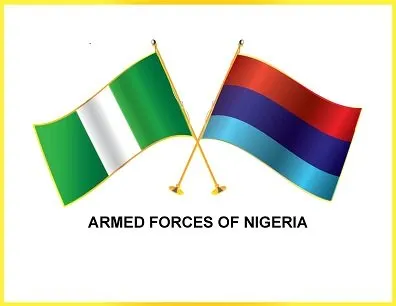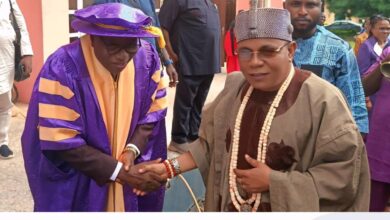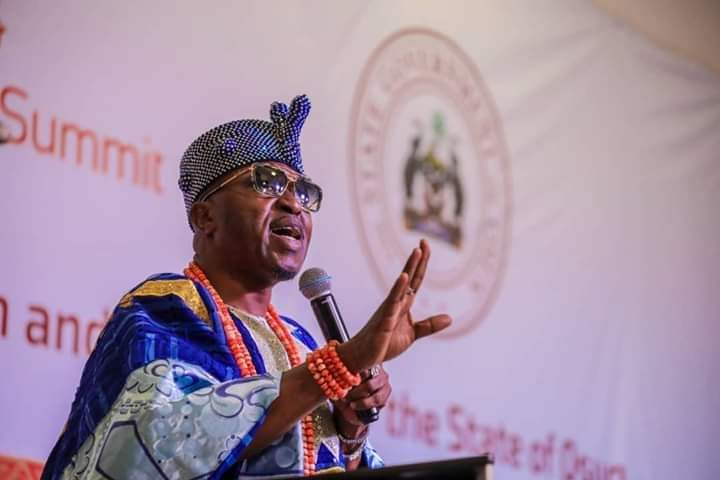ALGON donation of palliatives to geo-political zones: A mixed-perspective

By Lamidi Kazeem Oyedele
What makes this subject matter a mixed-perspective is, on the one hand, the savoury need of palliatives across the cultures in the Nigerian state; because it serves as instruments of economic resilience for human sustainability and livelihood in the midst of this pandemic. While federal and state governments have been championing the course of provision of palliatives for citizenry, it becomes not only pertinent to creditably acknowledge the stakes of local governments under their association umbrella, but to also laud this cardinal role play by local governments in league with the state and federal governments.
However, on the other hand, the ALGON donation raises an objectionable perspective as to its coordination at the level of geo-political zones under the inspectoral supervision of Federal Minister of Special Duties. It further begs for explanation as to its non-localness dexterity. Why should an association, whose territorial jurisdictions suffer immensely in palliative terms, show its supportive strength to a more viable level of nation-states? Is the alliance of local governments’ units meant to salvage the geo-political zones? Why is it that ALGON has failed to put heavy concentration on its area of concern? Of what importance or interest is this inordinate gesture to the geo-political zones?
At least, it would have brought some level of considerable perspective if it were to be coordinated at the level of geo-political zones for onward distribution to the local areas of concern. Even at that, its coordination at the level of geo-political zones appears somewhat irrelevant, since it intends to be distributed at the local areas where ALGON could be said to have coordinating powers. Or which instruments do the geo-political zones have, for distribution, preferable to that of local constituencies? Or are ALGON members lack the propensity or tenacity to achieve this emergency feat? These perspectives put the ALGON largesse into implementation hysteria.
The structure of ALGON might have clued up this palliative donation moves without taking cognisance of what, in fact, informed the formation of the association. Its quest, to contribute as stakeholders, has been made to overwhelm the supposed association responsibilities and to whom they are due. Of course, ALGON is nationally organised association of local governments with LG Chairmen and Chairpersons as its membership. While it tries to showcase the national outlook. It becomes inconsequential to its intended responsibilities on all fronts.
The report of ALGON donation of palliatives to geo-political zones, on NTA Network News of May 4th, 2020, came with good gesture owing to its provision, but still depicts an arguable level of inattention, negligence and poor visionary. Has ALGON adequately catered for the poor and vulnerable at their respective local areas before extending its support to the geo-political zones? The local welfare should be paramount at all expenses, not outrightly denying collaborative assistance.
Moreover, the question is: who, therefore, are the targeted beneficiaries of the palliatives at the geo-political zones? While trying to be considerate on the association side, one would still find it difficult to ponder over more logical rationale behind this support, at a time when the palliatives are largely needed by citizens within ALGON membership’s control. Another wonder is whether politics, as usual, is at play – which is refutably unwarranted at this critical time. Perhaps, the association is making public notice through this donation. Whatever the case may be, this piece is not mainly presenting antagonistic points of view, rather it aims at providing critical focal views for ALGON to maintain its core values, essential action centers and prioritisation of jurisdictional responsibilities among others.
In Nigeria, like any other federalist states, inter-governmental collaboration, no doubt, is a prominent working mechanism for efficient service provisioning and effective delivery. But, it should however be noted that this partnership should not infringe upon the exclusive functions of any level which, in this case, remains residual to local governments. Insightfully, the collaborative support comes second to the local government residual functions. Simply put, charity begins at home. ALGON should therefore note that localists’ perspectives should take the front-burner in formulation and implementation of social responsibilities in this period and beyond.
The jurisdictional quests are yet to be largely acted in their responses. As widely reported, large number of less priviledged households in different communities remains unconnected to the social registers used by the state and federal governments for conditional cash transfer and distribution of palliatives.
The inference, therefore, is that ALGON should, without intervening process, localise its donations of palliatives to the excluded individuals and groups, thereby mitigating the non-inclusion effect, as well as complementing the fall-outs of higher levels of government in their areas.
For record purpose, it is upon the satisfaction at the jurisdictional level that one could kindly expect the local governments under the umbrella of ALGON to tend largely towards assistance to higher levels of government. In a way, it is, in-turn, meant for those whom ALGON might have or might have not neglected at the local level. Thus, inter-governmental collaboration becomes secondary to localism in determining the action center for service delivery of this nature.
Furthermore, it is imperative to allude to the conceptual term of local-local relations as raison d’être for the formation of ALGON. This intends to concretise the exigency needs of ALGON at state, zonal and national levels to taking paramount the development agenda of local areas. This is also a tenable working mechanism among the 774 local government areas plus area councils across the states and FCT in the federation.
The alliance of local governments, under ALGON, is therefore meant to strengthening operational efficiency across the local areas in the federation, not elaborately for other level of governments in the public management of the Nigeria. Considerably, it could however be advanced that ALGON has exhibited federal-local relations as guiding conceptual term for its donation to the geo-political zones of Nigeria.
Again, this underlines a good gesture and practical example of plausible relationship between the federal and local governments, due to heavy financial reliance of latter on the former. But, in a simpler term at a time like this, it is antithetical to the fundamentals of ALGON’s formation; and it queries the association visions, thus underscoring misplacement of priorities.
This ALGON palliatives donation has raised dust over loss of concentration on jurisdictional responsibilities. Before this pandemic, its activities are mostly political, while popular concerted efforts remain unaccredited to ALGON on organisational challenges confronting local government administration in Nigeria, especially the issue on local government autonomy. One would expect to have been observing frequent debates in the media, serious engagement with stakeholders from universities with local government as course of study, organisation of seminars and workshops for addressing and designing the contemporary framework for local autonomy among other challenges.
It is important to stress here that ALGON should take advantage of the current administration of President Muhammadu Buhari and the distinguished Senate President, as well as the Speaker, House of Representative for the actualisation of local government autonomy. This is because their ‘body languages’ appear receptive to the autonomy of local government in relative terms.
Therefore, complementary efforts are to be geared by ALGON towards mobilising all relevant agencies in an express manner. Also, on its loss of concentration during this pandemic, there seems to be little popular guide solely credited to ALGON. Public analysts, including me, have written on the local governments’ roles in curtailing the spread of COVID-19 in Nigerian communities. Compliance seems evident, but it is yet to be optimised.
Moreso, what one could then be regarded as strong commitment by ALGON in terms of palliative is in disarray with its core values and responsibilities. Obviously, the relationship between ALGON and Federal Ministry of Special Duties is expected to be cordial over issues bordering on improving local government administration in Nigeria, as well as strengthening local development programme.
The question, therefore, is that: Is the ALGON donation of palliatives to geo-political zones through Federal Minister of Special Duties in tandem with their cordial obligations? Sarcastically, it is a case of improving the ‘improver’ (sic). This gesture becomes inordinate irrespective of the circumstances behind the donation, simply because it is a donation without clearly defined beneficiaries. However, it is advisable that the Minister should use his good office to appropriately order the distribution to the downtrodden across country homes. This Ministry should also assume its responsibilities on local government administration so as to shape local agenda and its conduct on inter-governmental affairs.
Furthermore, the position of ALGON should be re-awakened to the governance landscape. Although, there are constant problems with the functionality of the associations varying from state, zonal and national levels. Prominent ones among these problems are: strong appendage to their respective State Governors, loyalty to political godfathers, basis of their appointments as LG Chairman/Chairperson, undue political ambitions, and acting as political wings of their parties. These problems, among many others, have disengaged ALGON members from local public businesses.
The practice of ALGON members largely showed a clear negation to the emphasis of Stigler’s Menu in 1957 on the two principles of jurisdictional design. Firstly, the menu stresses that closeness of the representative government to the people so as to cater for local residents. This ALGON donation stands contrary to the first leg. Secondly, it emphasizes that the local people have right to vote for the kind and amount of services required with degree of power in decision-making.
However, in this regard, the right and power could not be exercised since choosing the leader to represent local population is not done in a right and democratic manner. The latter is not absolutely the fault of ALGON, rather they are beneficiaries of the local appointments by state governments. To this end, the Nigerian constitution should be respected by state governments across the federation, so as to put in place democratically elected representative councils, who in-turn become ALGON members, which the people can hold responsible and accountable at a crucial time like this and beyond.
Irrespective of the current composition of local government system, ALGON should not denigrate what could be a laudable gesture to its constituencies to geo-political zones. The advancement of local course should be exercised at its various levels, and ample opportunities should be harnessed for local development projects. This donation exercise has disparaged the grassroots potency which is against the supposed agitation of the association through its Board of Trustees and General Assembly.
Also, it is also a self-defeatist exercise for members and exposition of inadequacy in governance focus. It is therefore important for ALGON members to redirect their steps towards good governance at the local level.
Conclusively, it is instructive for ALGON to prioritise jurisdictional responsibilities in the discharge of overall service delivery. Strata of the association appear formidable, but it is suggested that technical committees should be put in place across its levels with a view to reviewing the actions and inactions of the association programmes as well as the intended and unintended effects primarily on their governing areas and the nation-states at large.
Expertise of academics and professionals in the field should be sought across the relevant universities and agencies. The committee will serve as think-tank unit for ALGON and assist in drafting executable policy proposals for local development agenda for the country both in short and long terms. While remedies of the existing problems of local government administration seem not imminent, but in the interim, ALGON members should, at least as succour, identify an essential service center which would be enjoyable by local residents. Overall, governance is most essential and practicable at the local areas. Therefore, ALGON should lift up to expectations amidst the surmountable challenges.
About the Author
Dr. Kazeem Oyedele Lamidi is a Lecturer in the Department of Local Government and Development Studies, Obafemi Awolowo University, Ile-Ife, Nigeria. Email address: akandekande@oauife.edu.ng








